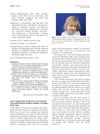 76 citations,
November 2010 in “Journal of The American Academy of Dermatology”
76 citations,
November 2010 in “Journal of The American Academy of Dermatology” Some African American women's central scalp hair loss is linked to genetics and past fungal scalp infections, with more research needed on other causes.
 15 citations,
February 2017 in “International Journal of Women's Dermatology”
15 citations,
February 2017 in “International Journal of Women's Dermatology” Hair aging and loss are caused by genetics, hormones, environment, and grooming, with treatments like minoxidil effective for certain types of hair loss.
12 citations,
January 2018 in “Journal of Clinical Laboratory Analysis” Certain IL-18 gene variations may increase the risk of alopecia areata.
 December 2023 in “EPRA international journal of multidisciplinary research”
December 2023 in “EPRA international journal of multidisciplinary research” Alopecia areata causes sudden hair loss, has genetic links, and can be managed but not cured.
 March 2019 in “Journal of Investigative Dermatology”
March 2019 in “Journal of Investigative Dermatology” Seborrheic dermatitis is influenced by diet, genetics, and psychological factors.
 80 citations,
January 1995 in “The American Journal of Medicine”
80 citations,
January 1995 in “The American Journal of Medicine” Hair loss in androgenetic alopecia is caused by genetic factors and androgen excess, and can be treated with combined therapies.
 2 citations,
August 2012 in “Journal of the American Academy of Dermatology”
2 citations,
August 2012 in “Journal of the American Academy of Dermatology” Two patients with the same genetic mutation had both blistering skin and easily pulled out hair.
June 2020 in “Journal of Investigative Dermatology” The symposium highlighted the importance of genetics in understanding and treating complex skin diseases.
 June 2018 in “Advances in Cosmetic Surgery”
June 2018 in “Advances in Cosmetic Surgery” Hair loss caused by genetics and hormones; more research needed for treatments.
September 2009 in “Hair transplant forum international”  32 citations,
August 1999 in “Journal of Investigative Dermatology”
32 citations,
August 1999 in “Journal of Investigative Dermatology” Early onset hair loss linked to genetics and androgen levels.
 7 citations,
January 2017 in “American Journal of Biological Anthropology”
7 citations,
January 2017 in “American Journal of Biological Anthropology” Sardinians were historically short due to a mix of genetics and factors like disease and poor nutrition, but recent height increases suggest better living conditions had a bigger impact.

Different genes cause Female Pattern Hair Loss compared to male hair loss, and treatments vary, but more research is needed to understand it fully.
 8 citations,
November 2018 in “Australasian Journal of Dermatology”
8 citations,
November 2018 in “Australasian Journal of Dermatology” Frontal fibrosing alopecia in families shows similar signs to individual cases and may have a genetic link.

Screening for iron levels in patients with hair loss may help find a genetic iron overload condition early.
 336 citations,
August 2015 in “European Journal of Epidemiology”
336 citations,
August 2015 in “European Journal of Epidemiology” The Rotterdam Study found risk factors for elderly diseases, links between lifestyle and genetics with health conditions, and aimed to explore new areas like DNA methylation and sensory input effects on brain function.
 71 citations,
November 2009 in “Best Practice & Research in Clinical Obstetrics & Gynaecology”
71 citations,
November 2009 in “Best Practice & Research in Clinical Obstetrics & Gynaecology” PCOS in teens is hard to diagnose, linked to genetics and lifestyle, and managed with weight loss and medication.
January 2022 in “Aesthetic surgery journal” Extracellular vesicles may effectively treat hair loss with minimal side effects.
 359 citations,
September 2017 in “European Journal of Epidemiology”
359 citations,
September 2017 in “European Journal of Epidemiology” The Rotterdam Study updated findings on elderly health, focusing on heart disease, genetics, lifestyle effects, and disease understanding.
 25 citations,
September 2010 in “Journal of Cutaneous Medicine and Surgery”
25 citations,
September 2010 in “Journal of Cutaneous Medicine and Surgery” The study found that Central Centrifugal Cicatricial Alopecia mainly affects middle-aged African descent women, is linked to certain hair care practices and genetics, and often goes undiagnosed for years.
 25 citations,
July 1991 in “International Journal of Dermatology”
25 citations,
July 1991 in “International Journal of Dermatology” Toxic Epidermal Necrolysis is a rare, serious skin condition that can affect anyone, is more common in women, and may be linked to genetics, with a 20% mortality rate mainly due to sepsis.
 13 citations,
March 2019 in “Pharmacology Research & Perspectives”
13 citations,
March 2019 in “Pharmacology Research & Perspectives” In Singapore, most skin reactions to drugs were in females and Chinese, often caused by painkillers, antibiotics, and some other drugs, with serious cases linked to genetics.
 3 citations,
May 2018 in “Experimental Dermatology”
3 citations,
May 2018 in “Experimental Dermatology” Young HS patients often have other physical and mental health issues, and research on HS covers a wide range of topics including genetics, triggers, treatments, and the need for more data.
 51 citations,
May 2019 in “Biomaterials”
51 citations,
May 2019 in “Biomaterials” Researchers developed a method to grow hair follicles using special beads that could help with hair loss treatment.
 May 2017 in “InTech eBooks”
May 2017 in “InTech eBooks” Follicular Unit Extraction (FUE) is a popular hair transplant method with minimal scarring that can transplant many grafts quickly and improve appearance and psychological well-being.
 340 citations,
September 2014 in “PLOS Genetics”
340 citations,
September 2014 in “PLOS Genetics” The study found that in Latin America, ancestry varies by location, influences physical traits, and affects how people perceive their own heritage.
 117 citations,
August 2019 in “Drug Design Development and Therapy”
117 citations,
August 2019 in “Drug Design Development and Therapy” Minoxidil effectively treats hair loss, but use cautiously and monitor side effects.
 99 citations,
July 2017 in “Clinical Reviews in Allergy & Immunology”
99 citations,
July 2017 in “Clinical Reviews in Allergy & Immunology” New treatments for Alopecia Areata show promise but need to be more effective and affordable.
 28 citations,
December 2017 in “Lasers in Medical Science”
28 citations,
December 2017 in “Lasers in Medical Science” Monochromatic light devices, especially the 308-nm excimer laser, are promising for treating alopecia areata but more research is needed.
 19 citations,
August 2011 in “Facial Plastic Surgery Clinics of North America”
19 citations,
August 2011 in “Facial Plastic Surgery Clinics of North America” Hair grafting is a key method for improving scars, especially in areas with hair, by transplanting hair to hide the scar while maintaining its original characteristics.


























